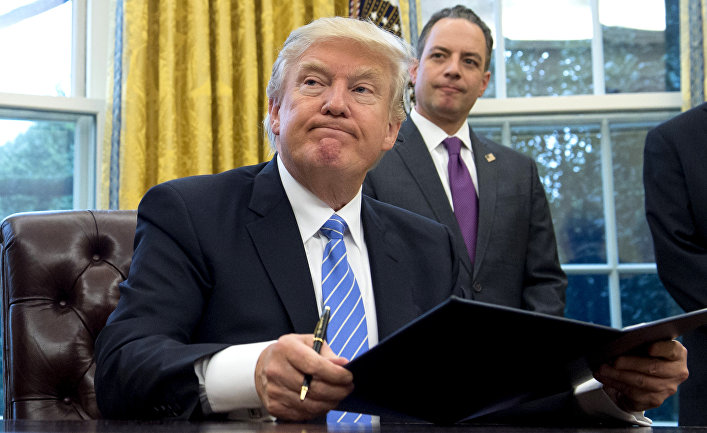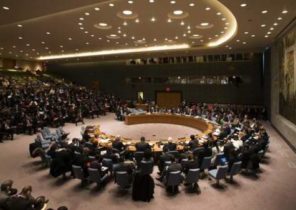
The victory of Donald trump in the election largely contributed to the wave of anti-globalization rage that swept the United States and other advanced economies. Trump voiced this outrage in their speeches. In his inaugural speech, he complained that America “has made other countries richer, while the wealth, power, and confidence went out of our country.” And now he responds to this anger with relevant policies. In the first days in office, trump has signed a decree on the withdrawal from the TRANS-Pacific partnership, has promised to renegotiate the North American free trade agreement (NAFTA) and prepared a moratorium on new multilateral agreement. He ordered to build a wall on the Mexican border, and threatened to establish a duty of 20% on imports from Mexico. And he was temporarily denied entry into the U.S. refugees, immigrants and travelers of the seven States with a predominantly Muslim population.
All this reflects a genuine scepticism about the benefits of globalization, opposition to trade agreements and concern about immigration, despite the protests, shared by many in American society.
But if the administration trump is configured to decrease U.S. involvement in international Affairs, America should immediately check the facts. The US is much less affected by international trade, immigration and other aspects of globalization than many Americans believe. The world in General is far less global than people think. A policy based on a reassessment of the globalization — the “globalstore” — may harm the people who are supposed to protect.
If you were asked to guess what the volume of US imports compared to local production, what would you say? Or what percentage of the US population are immigrants in the first generation? Rather, in both cases you would call a large percentage.
Given the rhetoric of the last time it may seem that the United States are among the most globalized countries in the world. But it’s not. On the basis of how much goods, services, capital and people crossing the border compared to what remains in the country, the United States got 100th place out of 140 in the index of global connectedness DHL, which we published in November 2016 (Deutsche Post DHL has financed the study, but did not affect the results).
The contrast between reality and rhetoric — particularly sharp in the two main areas of concern to U.S. trade and immigration.
In 2015, imported into the U.S. goods and services amounted to 15% of GDP. This means that America is dependent on imports for less than almost all other countries of the world. Only five countries imported goods and services in an even smaller proportion — Sudan, Argentina, Nigeria, Brazil and Iran. Although popular in the United States view is that everything is done in China for Chinese imports in the US pay less than three percent of total expenditures, and a significant share prices of Chinese goods are services of American companies for the transportation, sale and advertising of these products.
As to immigration, the first generation immigrants make up 14% of the total U.S. population. By this measure the U.S. is 27th in the world — above average, but not the first. Nevertheless, Americans believe that immigrants in the U.S. a lot more. According to the survey in 2015, conducted by Ipsos Mori, Americans believed that 33% of the total population were born outside the United States.
At the same time in 2013, the American respondents said that the share of immigrants is 42%, according to the survey of Fund of Herman Marshall. This is three times more than it actually is. Interestingly, if respondents to name the true number of immigrants, the number of those who believe that too many immigrants, is reduced by half. What is the popular opinion that immigrants are depriving Americans of jobs, leading economists agree — the technology took a lot more jobs than immigration or international competition.
If you ask the Americans about the degree of globalization of the world, the answer you will hear more “globalstore”. When we interviewed 1702 of American adults in 2012, it appeared that they believed that the level of globalization of the world five times higher than it actually is. Respondents suggested that eight times more people live outside their countries of birth than in reality, and overestimated the proportion of international trade by 50%. They also overestimated the proportion of international telephone calls (5%), fixed investment (10%) and even ties in Facebook (14%) and Twitter (25%).
Why are the people so deluded? People often believe what you desire the most or what very afraid. Their incorrect perception of globalization nourish political rhetoric and popular representations, as critics of globalization, such as the trump, and those who encourages them. In his bestseller “the world is Flat”, which went through two revised editions after the first publication in 2005, Thomas Friedman declared that we are witnessing the creation of “a global Internet-based platform for multiple forms of collaboration… This platform now operates irrespective of geography, distance, time and, in the near future, even language.” But in fact, the international flows are still largely constrained by the distances and the cultural, political and economic differences of the countries. That is why Canada and Mexico are among the principal trading partners of the United States on a par with China with its huge manufacturing base and a huge population. The share of each of the two neighboring countries have 15% of the turnover of the United States. But if an American company can create a foreign mission, more than 60% of cases it will be in Canada, Mexico or the UK (due to the factor of language and history).
Another reason for procenjivanja of globalization — the belief in the ability of technology to shrink the world. That technology deprives the distance value, say from about 1850-ies. However, this did neither the Telegraph nor the car nor the plane. Do this and the Internet because the interaction in the network reflects a real relationship. Although Facebook theoretically allows “friends” with the person on the other side of the world as easily as with a neighbor, people do not make friends at random.
So what on the scales? “Globalstar” would be funny, if not very dangerous consequences.
Exaggerated perception of globalization greatly complicates the solution of existing problems. Income inequality in the United States, for example, reached levels not seen since the 1920-ies. Politically profitable to blame it on other countries, but the limited role of imports in the American economy that meets the research, according to which, a greater contribution to make this internal factors such as technological change and the weakening of trade unions. A key means to combat inequality are such internal means as taxes, education, labour laws and so on. If we instead will cut back on international flows, the risk to forget about the necessary difficult compromises. In addition, the process of de-globalization will reduce economic growth, and it can complicate funding for us an effective policy response.
The same model can be found in many other political spheres. You fear that corporations konsolidiruyutsya and harm consumers? “Globalstar” will make you focus on the concentration of the global market, whereas a normal concentration within a country or within a district has a greater value. Expel foreign competition, and problems of the internal market will only intensify. Are you concerned about food security? Only six percent of milk, nine percent of rice, 12% corn and 22% of the wheat sold on the international market, but trade saves in case of crop failure in the country.
“Globalstar” can also distort our view on allies. If the world really was flat, then Mexico would have the same strategic importance for the United States, as Spain and Indonesia, countries with the same economic indicators. But since the distance has a value, that the deterioration in us-Mexican relations is a serious concern. As said former President of Mexico Vicente Fox, relations are at their lowest level since ended in 1848, the war between the US and Mexico.
Finally, we should remember what happened last time, when globalization began to decline. In 1930 the US passed a Law on tariffs Smoot-Hawley (Smoot-Hawley Tariff Act), this caused a response, and the volume of global trade fell by two-thirds. The failure of the first wave of globalization played a big role in the beginning of the great Depression. And between that period and our own day there is an unnerving similarity — the growth of inequality, an emerging power (today China, then Germany was), challenging the world order, as well as the increase in manifestations of racism and extremism.
Although the scale of globalization today is much less than is commonly believed, it is a mistake to believe that it is possible to refuse international integration painless. History teaches us that de-globalization could lead to catastrophic consequences. As the scope of international trade and international investment today in the three to four times higher than during the last big reversal of course back from globalization, this time the effects of de-globalization may be even worse.







